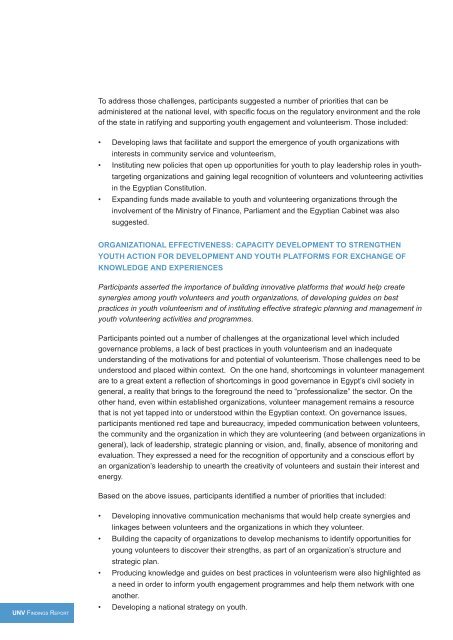J7rQWv
J7rQWv
J7rQWv
Create successful ePaper yourself
Turn your PDF publications into a flip-book with our unique Google optimized e-Paper software.
To address those challenges, participants suggested a number of priorities that can be<br />
administered at the national level, with specific focus on the regulatory environment and the role<br />
of the state in ratifying and supporting youth engagement and volunteerism. Those included:<br />
• Developing laws that facilitate and support the emergence of youth organizations with<br />
interests in community service and volunteerism,<br />
• Instituting new policies that open up opportunities for youth to play leadership roles in youthtargeting<br />
organizations and gaining legal recognition of volunteers and volunteering activities<br />
in the Egyptian Constitution.<br />
• Expanding funds made available to youth and volunteering organizations through the<br />
involvement of the Ministry of Finance, Parliament and the Egyptian Cabinet was also<br />
suggested.<br />
ORGANIZATIONAL EFFECTIVENESS: CAPACITY DEVELOPMENT TO STRENGTHEN<br />
YOUTH ACTION FOR DEVELOPMENT AND YOUTH PLATFORMS FOR EXCHANGE OF<br />
KNOWLEDGE AND EXPERIENCES<br />
Participants asserted the importance of building innovative platforms that would help create<br />
synergies among youth volunteers and youth organizations, of developing guides on best<br />
practices in youth volunteerism and of instituting effective strategic planning and management in<br />
youth volunteering activities and programmes.<br />
Participants pointed out a number of challenges at the organizational level which included<br />
governance problems, a lack of best practices in youth volunteerism and an inadequate<br />
understanding of the motivations for and potential of volunteerism. Those challenges need to be<br />
understood and placed within context. On the one hand, shortcomings in volunteer management<br />
are to a great extent a reflection of shortcomings in good governance in Egypt’s civil society in<br />
general, a reality that brings to the foreground the need to “professionalize” the sector. On the<br />
other hand, even within established organizations, volunteer management remains a resource<br />
that is not yet tapped into or understood within the Egyptian context. On governance issues,<br />
participants mentioned red tape and bureaucracy, impeded communication between volunteers,<br />
the community and the organization in which they are volunteering (and between organizations in<br />
general), lack of leadership, strategic planning or vision, and, finally, absence of monitoring and<br />
evaluation. They expressed a need for the recognition of opportunity and a conscious effort by<br />
an organization’s leadership to unearth the creativity of volunteers and sustain their interest and<br />
energy.<br />
Based on the above issues, participants identified a number of priorities that included:<br />
• Amending Egypt’s civil society law.<br />
• Developing mechanisms to facilitate youth volunteerism.<br />
• Developing linkages and synergies among important stakeholders while grounding this in<br />
quantitative and qualitative research on youth in Egypt.<br />
Partners suggested by the participants included local initiatives as well as national and<br />
international organizations such as the Association for Development of Local Community,<br />
Qaliubiyya, Zidny Initiative, Qabila, Eyoun Masr Association, Association of the Arts for<br />
Development, Egyptian Federation for Scouts and Girl Guides, student unions, the Egyptian<br />
Media Professionals Association, Y-Peer, Plan International, Egyptian Youth Federation and the<br />
Arab League.<br />
INDIVIDUAL ENGAGEMENT AND EMPOWERMENT: CREATING YOUTH VOLUNTEER PRO-<br />
GRAMMES TO FACILITATE AN ENABLING ENVIRONMENT FOR EMPLOYMENT, ENTRE-<br />
PRENEURSHIP, POLITICAL INCLUSION, CITIZENSHIP AND PROTECTION OF RIGHTS,<br />
AND EDUCATION<br />
Participants asserted the necessity of building informed youth programmes that are grounded<br />
in analytical research on youth needs, expectations and challenges; that build on successful<br />
examples and already existing networks and platforms and that use multiple advocacy<br />
mechanisms to guarantee impact and coverage of a wider geographic scope.<br />
At the individual level of programmes, participants identified a number of cross-cutting<br />
challenges that are policy-oriented, cultural and institutional. Those included the limiting<br />
regulatory environment for civil society and organizations, lack of funding, lack of networking<br />
among organizations with volunteering activities and lack of platforms to promote synergies<br />
among the different youth programmes. Participants also voiced concerns regarding challenges<br />
that volunteers face at the individual level. Those revolved around poverty, a lack of financial<br />
resources for volunteers to engage in voluntary activities while they are expected to be earning<br />
income, a lack of motivation and self-confidence, a dearth of role models in society where<br />
volunteering is promoted, lack of adequate individual skills (both hard and soft) that could<br />
be used in the voluntary sector and, finally, that both government and civil society, to varying<br />
degrees, are not fully inclusive of youth and women. To describe challenges faced at the<br />
individual level, participants used phrases such as “passivity, lack of respect to volunteering”,<br />
“lack of clarity of target”, “reward” (which was crossed out afterwards), “incentives and<br />
motivations”, “discovering self-capacity”, “lack of volunteering curriculum”, “marginalized groups”.<br />
Based on the challenges, participants identified a number of priorities that included:<br />
UNV Findings Report<br />
• Developing innovative communication mechanisms that would help create synergies and<br />
linkages between volunteers and the organizations in which they volunteer.<br />
• Building the capacity of organizations to develop mechanisms to identify opportunities for<br />
young volunteers to discover their strengths, as part of an organization’s structure and<br />
strategic plan.<br />
• Producing knowledge and guides on best practices in volunteerism were also highlighted as<br />
a need in order to inform youth engagement programmes and help them network with one<br />
another.<br />
• Developing a national strategy on youth.<br />
• Developing programmes with innovative funding mechanisms offering volunteering<br />
opportunities.<br />
• Promoting self-confidence and role models in society.<br />
• Integrating capacity development at the individual level by providing individuals with soft and<br />
hard skills through volunteering programmes (including organizations providing individual<br />
skills).<br />
• Ensuring volunteering programmes bridge generation gaps and are more inclusive of youth,<br />
women and other marginalized groups.<br />
Egypt 10


